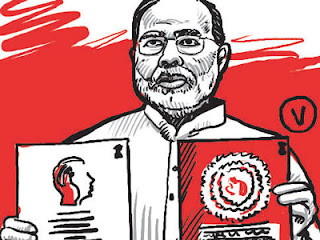Millions of
workers across India have begun a 24-hour strike in protest against
planned labor law reforms, the biggest show of strength by trade unions since
Prime Minister Narendra Modi took office last year. The strike, the biggest
in India for more than two years, included staff at state-run banks and mines
as well as some factory, construction and transport workers.
Most
cities remained peaceful, but clashes
between police and activists broke out in the eastern state of West Bengal,
which has a long history of left-wing
union activism. Nearly 200 people were arrested across the West Bengal.
Banks, shops and other businesses remained closed in Kolkata, stranding
commuters and travellers at the main station, while dozens of flag-waving
protesters halted suburban trains.
Click here to read more on the SSB Interview Process
Also read - All you need to know what happens in Psychology of SSB?
Click here to read more on the SSB Interview Process
Also read - All you need to know what happens in Psychology of SSB?
In Delhi,
long queues formed at bus stops early on Wednesday, while passengers were
stranded at airports as taxis and auto rickshaws stayed off the streets. Some
protesters were reported to have forced auto rickshaw and taxi drivers off the
roads and vandalized their vehicles.
Unions
say labor reforms planned by Modi's government will put jobs at risk, and are
demanding it scrap changes that would make it easier to lay off workers and
shut down unproductive factories.
Why is there a need for Labor Reforms?
The World Bank says India
has one of the world's most rigid labor markets, but fears of a trade union
backlash and partisan politics have deterred successive governments from reform
measures. It has in turn has been a drag on
manufacturing, which accounts for only 16 percent of India's $2 trillion
economy, compared with 32 percent of China's. Some 84
percent of India's manufacturers employed fewer than 50 workers in 2009,
compared with 25 percent in China, according to a study published by
consultancy firm McKinsey & Co. last year.
Economists say India urgently needs to liberalize land and labor markets
to speed up economic growth that slipped to 7 percent in the June quarter,
raising worries that the full-year figure could undershoot the official target
of 8 to 8.5 percent. The changes,
if approved by parliament, would be the biggest economic reform since India
opened its economy in 1991.
Economists
also cite current labour rules as the
biggest constraint on Modi's "Make in India" ambition to spur a
manufacturing boom creating jobs for 200 million Indians reaching working age
over the next two decades. Just 8 percent of manufacturing workers in India are
in formal employment, the rest are short-term contractors who enjoy minimal
social security benefits.
Also,
labour law reforms will create a conducive environment for growth of trade and
Industry and bring transparency in social security benefits to help workers.
Click here to Join our Facebook group and stay updated!!!
Click here to read - All you need to know about GTO rounds at SSB
Click here to read - All you need to know about GTO rounds at SSB
The Labour Reforms and its Benefits:
While the
Centre has amended the Apprentices Act,
1961 and the Labor Laws (Exemption from Furnishing Returns and
Maintaining Registers by Certain Establishments) Act, amendments to the Factories Act, 1948 are pending with
Parliament. It has also finalized changes to the Child Labor (Prohibition and Regulation) Act, 1986 and is working
on umbrella legislation for small factories as well as easier laws of
retrenchment of workers. The labor ministry has been fleshing out a plan to merge the Industrial Disputes Act,
Industrial Employment (Standing Orders) Act and the Trade Unions Act into a
single code for industrial relations.
The measures announced will simplify employment rules and smooth the way for people to move
social security funds when they change jobs. They also provide for an improved pension and minimum salary grade.
It will facilitate ease of doing business while ensuring safety, health and
social security of every worker.there is lot more in the labor reforms and the befits that our country can reap but there are hindrances as well that we will see in the next part of this series, so keep reading.
Click here for - SSB Lecturette Series: New Labor Reforms in India - Part 2
Hope you like our efforts. Keep sharing with your friends and other defense aspirants.
Click here for - SSB Lecturette Series: New Labor Reforms in India - Part 2
Hope you like our efforts. Keep sharing with your friends and other defense aspirants.
About the Author:
Pranav Nikam is an Electrical and Electronics engineer who is working in a renowned MNC in Chennai. He likes to work out in gym, do photography and play badminton. Through his articles he wants to spread awareness among other defence aspirants.
|



No comments:
Post a Comment